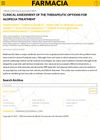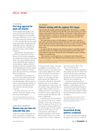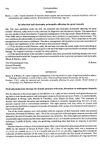56 citations,
September 2010 in “Veterinary pathology” Certain mouse strains develop a skin condition similar to a human hair loss disease due to genetic defects.
 September 2023 in “International journal of women’s dermatology”
September 2023 in “International journal of women’s dermatology” Certain hairstyles, diabetes, scalp infections, and vitamin D deficiency may increase the risk of hair loss in Black women; more research is needed for better treatment.
 December 2021 in “Farmacia”
December 2021 in “Farmacia” Different hair loss treatments like topical mixtures, plasma infiltrations, and oral medicine can stop hair loss and improve hair density and follicle size.
January 2004 in “Indian Journal of Nephrology” 1 citations,
January 2022 in “Springer eBooks”  234 citations,
December 1996 in “Journal of The American Academy of Dermatology”
234 citations,
December 1996 in “Journal of The American Academy of Dermatology” Middle-aged women with chronic telogen effluvium experience increased hair shedding but usually don't get significantly thinner hair.
 67 citations,
September 2008 in “Dermatologic therapy”
67 citations,
September 2008 in “Dermatologic therapy” Hirsutism is excessive hair growth in women often caused by polycystic ovarian syndrome, and identifying the cause is important for managing associated health risks.
 39 citations,
July 2008 in “Dermatologic Therapy”
39 citations,
July 2008 in “Dermatologic Therapy” Pseudopelade of Brocq is a unique hair loss condition, but its cause and development are still not fully understood.
 22 citations,
January 2014 in “International Journal of Trichology”
22 citations,
January 2014 in “International Journal of Trichology” Hair restoration surgery can lead to swelling, infections, scarring, numbness, hiccups, and poor hair growth.
 18 citations,
October 2012 in “Dermatologic Clinics”
18 citations,
October 2012 in “Dermatologic Clinics” Early diagnosis and aggressive treatment are key for managing rare scalp disorders that cause permanent hair loss.
 1 citations,
February 2016 in “European Journal of Obstetrics & Gynecology and Reproductive Biology”
1 citations,
February 2016 in “European Journal of Obstetrics & Gynecology and Reproductive Biology” An 84-year-old woman's hair loss was due to a rare condition called Leydig cell hyperplasia, which was treated with surgery.
 1 citations,
January 2006
1 citations,
January 2006 Hirsutism is mainly caused by high androgen levels or sensitivity, with PCOS being the most common cause.
 July 2017 in “Nursing2023”
July 2017 in “Nursing2023” Actemra is approved for a specific artery condition, HIV treatment adherence has improved, women may pay more for a hair loss product, and incorrect dosing of blood thinners can be risky.
 June 2007 in “Endocrinology and Metabolism Clinics of North America”
June 2007 in “Endocrinology and Metabolism Clinics of North America” The document covers various male health issues, their causes, treatments, and related conditions.
 947 citations,
February 2004 in “The Journal of Clinical Endocrinology and Metabolism”
947 citations,
February 2004 in “The Journal of Clinical Endocrinology and Metabolism” Most women with excess male hormones have Polycystic Ovary Syndrome, and hormonal therapy can improve symptoms but may cause side effects.
 85 citations,
June 2006 in “Best Practice & Research Clinical Endocrinology & Metabolism”
85 citations,
June 2006 in “Best Practice & Research Clinical Endocrinology & Metabolism” The document concludes that hirsutism is the main sign for diagnosing hyperandrogenism, which requires a detailed patient history and physical exam.
 75 citations,
October 1996 in “Dermatologic Clinics”
75 citations,
October 1996 in “Dermatologic Clinics” Chronic Telogen Effluvium is a hair loss condition in middle-aged women that usually doesn't lead to complete baldness.
 67 citations,
July 2006 in “Clinics in Dermatology”
67 citations,
July 2006 in “Clinics in Dermatology” Androgens cause skin issues like acne and hair growth in women, often due to PCOS, and can be treated with medication and lifestyle changes.
 42 citations,
July 2015 in “Journal of The American Academy of Dermatology”
42 citations,
July 2015 in “Journal of The American Academy of Dermatology” The conclusion is that oral contraceptives and antiandrogens can treat hirsutism and acne in women with cutaneous hyperandrogenism, but more research is needed for effective treatments, especially for hair loss.
 35 citations,
January 2009 in “Indian Journal of Dermatology, Venereology and Leprology”
35 citations,
January 2009 in “Indian Journal of Dermatology, Venereology and Leprology” Older adults commonly experience wrinkles, itchy skin, psoriasis, fungal infections, skin growths, grey hair, hair loss, and nail ridging, but no skin cancer was found in this group.
 31 citations,
November 2014 in “Journal of Endocrinological Investigation”
31 citations,
November 2014 in “Journal of Endocrinological Investigation” Women with androgen excess, especially those with PCOS, have a much higher risk of heart disease and stroke.
 25 citations,
October 2018 in “Journal of The American Academy of Dermatology”
25 citations,
October 2018 in “Journal of The American Academy of Dermatology” Erosive pustular dermatosis of the scalp is a type of skin inflammation often confused with other conditions, requiring continuous treatment.
 20 citations,
April 2006 in “Dermatologic Clinics”
20 citations,
April 2006 in “Dermatologic Clinics” Antiandrogen therapies are beneficial for treating skin and hair conditions related to androgen levels.
 11 citations,
January 2018 in “Annals of Dermatology”
11 citations,
January 2018 in “Annals of Dermatology” Some people experienced temporary hair loss after hair transplant surgery but recovered fully within 10 months.
 11 citations,
May 1990 in “Journal of Dermatological Science”
11 citations,
May 1990 in “Journal of Dermatological Science” Diazoxide applied to the skin can increase hair growth without harmful side effects.
 11 citations,
January 1985 in “British Journal of Dermatology”
11 citations,
January 1985 in “British Journal of Dermatology” The document concludes that an inherited nail condition often improves on its own, and spironolactone effectively treats acne in women.
 8 citations,
March 2014 in “Dermatologic Clinics”
8 citations,
March 2014 in “Dermatologic Clinics” Specialized techniques are needed for hair restoration in individuals with curly Afrocentric hair due to unique challenges.
 7 citations,
January 2015 in “Case reports in endocrinology”
7 citations,
January 2015 in “Case reports in endocrinology” The document concludes that HAIR-AN syndrome should be considered when a patient shows severe hyperandrogenism and insulin resistance after excluding tumors.
 6 citations,
May 2020 in “JAMA Ophthalmology”
6 citations,
May 2020 in “JAMA Ophthalmology” Using 5-alpha-reductase inhibitors, drugs for prostate issues and hair loss, may lead to eye abnormalities in men.
 6 citations,
October 2018 in “Lasers in Medical Science”
6 citations,
October 2018 in “Lasers in Medical Science” Low-level laser therapy using near-infrared light may help heart conditions and promote healing by releasing nitric oxide.


























